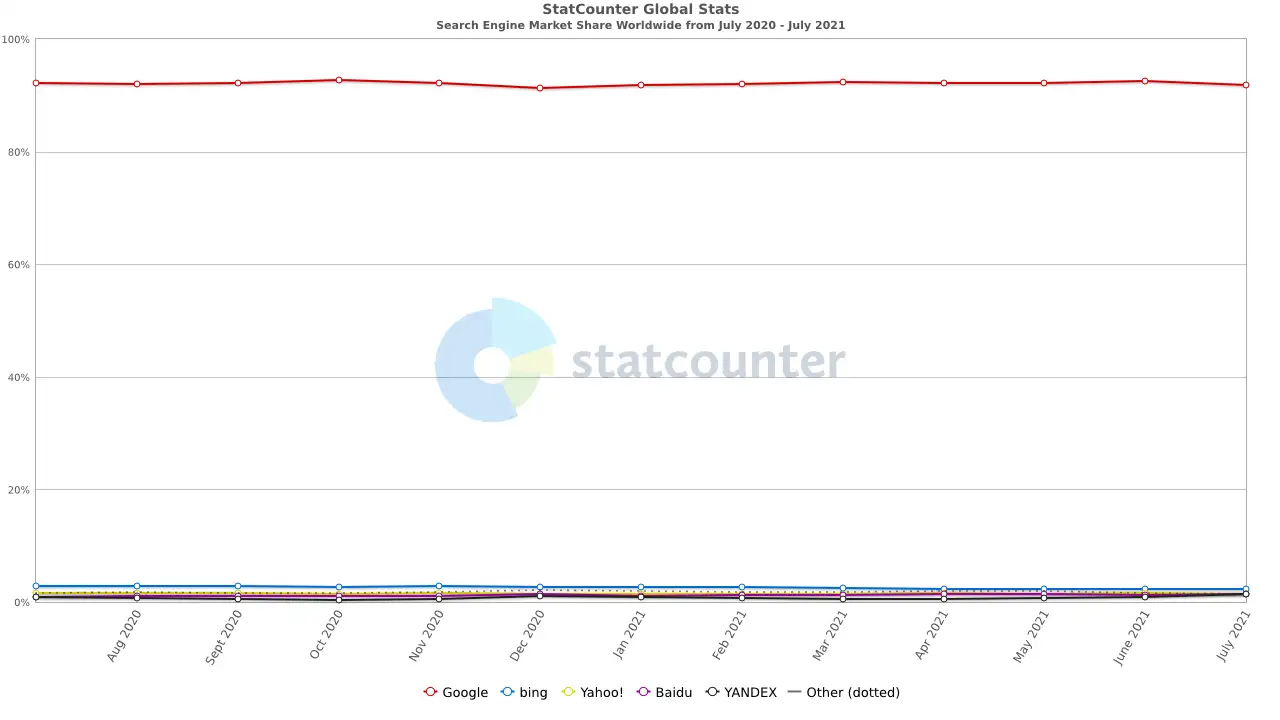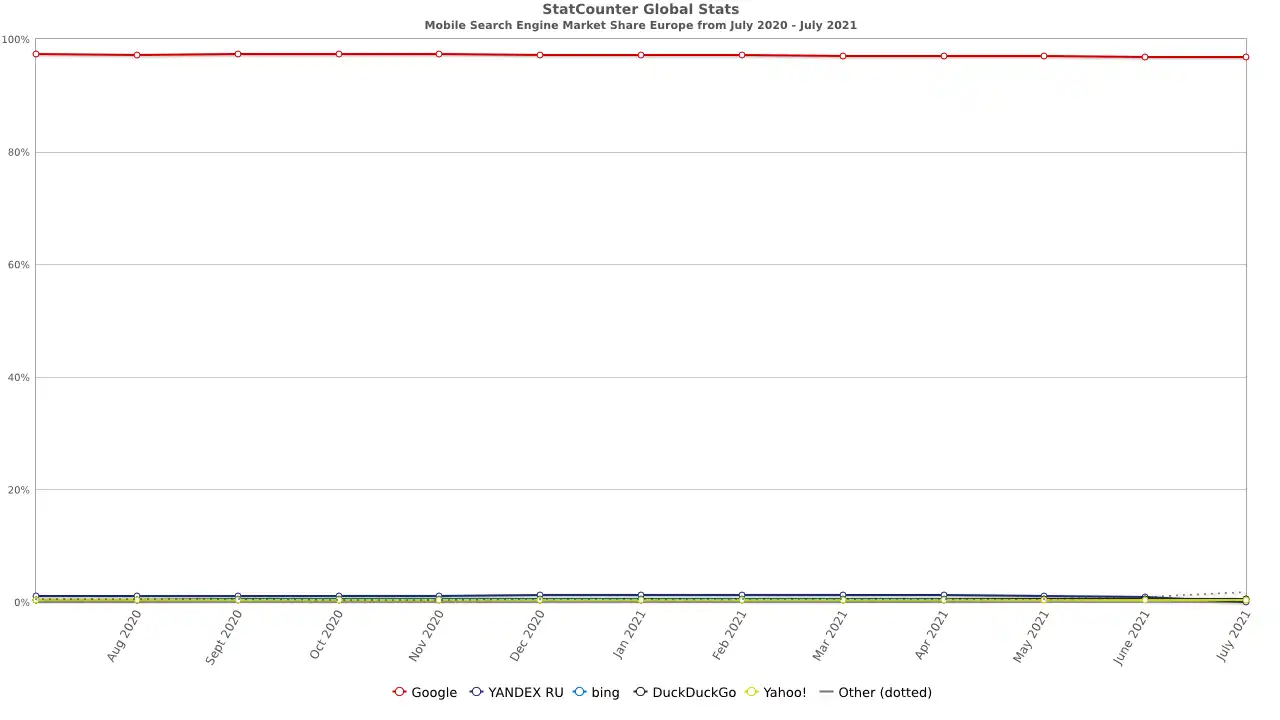Full disclosure: I’m not an expert. This post talks about search engines competing with Google and has no conclusive answer to the question in the title. I personally use Bing and Google.
In the past year, there's been news about existing or upcoming search engines competing with Google:
- Apple develops alternative to Google search
- Search engine start-ups try to take on Google
- Brave takes on Google with privacy-focused search engine
- Inside Neeva, the ad-free, privacy-first search engine from ex-Googlers
- Former Salesforce chief scientist announces new search engine to take on Google
At the time of this post, Google has 92% of the global market share for search engines.

The market share for a given company is usually the company's number of units sold over the industry's number of units sold. For search engines, it's unclear if the units are users or search queries but either wouldn't detract from what's being said in this post.
No search engine comes close to Google in market share. Every search engine that's not Google has less than 3% global market share. How can an existing or upcoming search engine gain a double-digit (at least 10%) market share?
One of the biggest challenges that new and existing contenders in the search space face is that Google search is the default search engine in many countries, including the US, in popular browsers like Chrome, Firefox, and Safari. By default, Google search dominates. There's a high "activation energy" for a user to consider and switch to a new search engine.
When Mozilla switched from Google to Yahoo [1] for Firefox's default search engine in the U.S., it seems that a significant (if not most) Firefox users were okay with the change: Google's US desktop search share dips after Yahoo-Firefox tie up (2015). Any non-default search engine that wishes to compete with the default search engine will need to put themselves in front of a user, so that the user is aware of the option, and convince the user to change their current search engine: Google Suggesting Firefox Users Change Their Search Engine & Home Page (2015).
If you're building a search engine where the target audience is anyone and everyone then you're going to have a real tough time gaining substantial global market share if the default search engine isn't yours. If most people use the default search engine, then what's an up-and-coming search engine supposed to do about that? Some believe the government should intervene and break up monopolies that benefit by being the default on a platform.
In 2018, the European Commission (EC) fined Google $5 billion for "illegal practices regarding Android mobile devices to strengthen dominance of Google's search engine". From the EC statement:
Pre-installation can create a status quo bias. Users who find search and browser apps pre-installed on their devices are likely to stick to these apps. For example, the Commission has found evidence that the Google Search app is consistently used more on Android devices, where it is pre-installed, than on Windows Mobile devices, where users must download it. This also shows that users do not download competing apps in numbers that can offset the significant commercial advantage derived through pre-installation.
In response, Google decided to let users, in the UK and members of the European Economic Area (EEA), pick from one of a handful of search engines when users are setting up a new Android device. Awesome! So how does Google decide which search engines can be on the list that users see? Through an auction. Gotta spend money to make money.
Google's response is a step in the right direction. An auction seems suboptimal for potential competitors but it's hard to say what's fair. One could argue there should be more than four search engines and search engines shouldn't have to pay to be on the list. One could also argue that having more than four choices is bad UX and Google should be able to make money from the fact that other search engines are profiting from Google's platform (Android), but I digress.
The choice screen was rolled out in March 2020 and it had no distinguishable impact. Take a look at this line graph of search engines' market share in Europe on mobile devices:

Android has 84% market share in Europe and, on average, people in Western Europe hold on to their devices for around three years so if the choice screen had an impact then we would expect it to be at least somewhat visible in the graph above.
When given a choice, users seem to consistently choose Google over its competitors. Why? Probably because Google search is known to be good (users aren't taking a risk by choosing Google) and Google has good branding (you're "googling" but never "binging" or "duckduckgo-ing").
Forcing users to choose is a pre-requisite for alternative search engines to thrive on platforms that would otherwise provide a default search engine. Evidently, giving users a choice is not the only necessary thing for a search engine that wishes to de-throne Google search.
If you want to build a search engine with >10% market share, you could pay off a browser to set your search engine as the default (e.g. Google pays Mozilla to have Google be the default search engine on Firefox in the US) or you could consider building a browser where your search engine is the default search engine (but then your browser has to be popular). Examples of companies building search engines and browsers:
- Google (and Google search) was made in 1998. Google released Chrome in 2008.
- Microsoft released Internet Explorer in 1995 and Bing was released in 2009. Microsoft also released EdgeHTML in 2015 and Edge based on Chromium in 2020.
- Apple made Safari in 2003 and there are rumors of Apple working on a search engine today.
- Brave released their browser in 2019 and they are building a search engine.
To build a popular browser, you have to do at least one of the following:
- Build a significantly better browser with good marketing (e.g. Chrome for desktop).
- You must have an operating system to ship your browser as the default (e.g. Apple's Safari on macOS and iOS, Google's Chrome on Android and ChromeOS, Microsoft's IE and Edge on Windows).
Having a popular OS means you can ship a default browser which means you can also ship a default search engine.
If you want to build a popular search engine, build a popular browser. If you want to build a popular search engine, then build a popular operating system. Yeah that's not feasible so let's move on.
Trying to build a search engine with >10% market share is tough but is it possible to build a profitable search engine? Yes, there are several profitable search engines with a fraction of Google's market share: Baidu, Bing, DuckDuckGo, Ecosia, Yahoo, Yandex, and more. Additionally, I think there is a lucrative opportunity for search experiences in enterprise settings.
There is a set of businesses that will switch to, and pay $$$ for, a search engine that makes all their business artifacts easily discoverable. Bing has a "Work tab" available for businesses that integrates Microsoft products and services in search results so that users can find Word documents, Sharepoint sites, OneNote pages, and more in one place. The Work tab has been very useful for me at work. Google has a similar product to search across a company's "Docs, Sheets, Slides, Calendar, and more". Creating a search experience for business depends on you having access to the business' data (e.g. documents, powerpoints, spreadsheets, videos). The most feasible way to get access to that data is if you already having those businesses use your company's products for producing business artifacts so that your search experience can be built on that data. That's what Google and Microsoft do. Another way is to rely on APIs provided by companies with popular services for businesses (e.g. Microsoft Graph) and integrate them into your search experience but that's both expensive and dangerous; you probably don't want your core business to depend on, and be limited by, APIs that you don't own—unless there are hard guarantees that can mitigate these concerns.
Building a new search experience that's profitable has been and will be done again and again; it's very difficult but it is evidently possible. Building one that's popular is far, far more difficult and it's unclear how it's possible to do that today. I think the next search engine that obtains >10% market share in search will capitalize on one of the following opportunities for improvement in the modern search experience:
- One Search to Rule Them All: We need an "all-encompassing" search that takes into consideration data across apps. Currently, our data is siloed across various native apps and browser apps/sites so each one has its own search feature. This is true in both the consumer world and commercial world. I want to be able to search across everything (e.g. searching for "my tax documents" should return all my relevant tax documents).
- Good SEO does not mean Good Quality: I append "reddit" to some of my search queries so that I can read what a group of people on Reddit [2] have to say (via posts, comments, and upvotes), instead of reading what some listicle by one author on a website with good SEO has to say. When I look up "how to find a job in tech", the first article on Google's search results is from a website run by one person who wrote a listicle that says Visual Basic is one of the top programming languages to learn in 2021. The Visual Basic subreddit discourages people from learning it on the basis that several other programming languages are more worthwhile to learn.
- Privacy and Ads: An increasing number of people seem to value privacy and the prevalence of ads has led to low quality content taking up space on our displays.
This post concludes with no conclusion. Below are the footnotes.
[1] Later, Mozilla switched back from Yahoo to Google for Firefox's default search engine (in the US). When Mozilla initially signed their deal with Yahoo, Mozilla's legal team slipped in a sneaky little clause that effectively said, "hey if you (Yahoo) get acquired then we (Mozilla) don't need to keep you as the default search engine for Firefox users in the US but you still have to continue paying us". Some time later, Verizon acquired Yahoo and what followed is mildly humorous (not for Yahoo). Mozilla set up a contract with Google for Google to be the default search engine in the US on Firefox, Mozilla swiftly removed Yahoo as the default search engine in the US, and Mozilla still sent an invoice for a large sum to Yahoo. Yahoo was bewildered, a lawsuit ensued, and a counter lawsuit ensued. In 2019, Yahoo settled with Mozilla. Mozilla made some extra money that year; "Mozilla reports $338M revenue spike from settlement over Yahoo contract". I hope Mozilla's legal team got a big bonus that year.
[2] A community can be vulnerable to astroturfing and low-quality content. Imagine you visit a footwear-related subreddit to see suggested running shoes but there are active users and mods on Crocs' payroll and they're recommending the LiteRide™ Clog. Imagine you're looking for sound financial advice but you stumble across r/wallstreetbets.